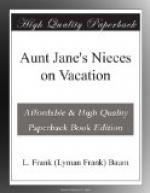“No,” she said; “I ain’t talented, Skim, an’ you be.”
“What I orter hev,” he continued, reflectively, “is a typewriter. When I git two er three hunderd ahead perhaps I’ll buy one—secondhand.”
“Kin ye buy one thet’ll spell, Skim?” she asked, as she made a neat roll of the manuscript and tied a pink hair ribbon around it.
Skim put on a collar and necktie and took his story across to the newspaper office.
“I got a conter-bution fer the paper,” he said to Patsy, who asked him his business.
“What, something original, Skim?” she asked in surprise.
“Ye’ve hit it right, Miss Doyle; it’s a story.”
“Oh!”
“A detective story.”
“Dear me! Then you’ll have to see Mrs. Weldon, who is our literary editor.”
Louise, who was sitting close by, looked up and held out her hand for the beribboned roll.
“I don’t jes’ know,” remarked Skim, as he handed it across the table, “whether it’s a thirty dollar deal, er a fifty.”
Having forgotten Beth’s editorial, Louise did not understand this remark, but she calmly unrolled Skim’s manuscript and glanced at the scrawled heading with an amused smile.
“‘Suspecting Algernon,’” she read aloud.
“’It were a dark and teedjus night in the erly springtime while the snow were falling soft over the moon litt lanskape.’ Why, Skim, how came you to write this?”
“It were the money,” he said boldly. “I kin do one a day like this, at thirty dollers apiece, an’ never feel the wear an’ tear.”
Patsy giggled, but Louise stared with a wondering, puzzled expression at the crabbed writing, the misspelled words and dreadful grammar. Indeed, she was a little embarrassed how to handle so delicate a situation.
“I’m afraid we cannot use your story, Mr. Clark,” she said gently, and remembering the formula that usually accompanied her own rejected manuscripts she added: “This does not necessarily imply a lack of merit in your contribution, but is due to the fact that it is at present unavailable for our use.”
Skim stared at her in utter dismay.
“Ye mean ye won’t take it?” he asked with trembling lips.
“We have so much material on hand, just now, that we cannot possibly purchase more,” she said firmly, but feeling intensely sorry for the boy. “It may be a good story—”
“It’s the bes’ story I ever heard of!” declared Skim.
“But we have no place for it in the Millville Tribune,” she added, handing him back the roll.
Skim was terribly disappointed. Never, for a single moment, had he expected “sech a throwdown as this.”
“Seems to me like a bunco game,” he muttered savagely. “First ye say in yer blamed ol’ paper a story’s wuth thirty to fifty dollars, an’ then when I bring ye a story ye won’t pay a red cent fer it!”
“Stories,” suggested Louise, “are of various qualities, depending on the experience and talent of the author. An excellent story is often refused because the periodical to which it is offered is overstocked with similar material. Such conditions are often trying, Skim; I’ve had a good many manuscripts rejected myself.”




